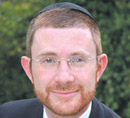Unsettled by the terminology
IN other places they would be called “towns”, “villages” or “neighbourhoods”. The people who live in such districts, be they Chinese in Tibet, Protestants in Northern Ireland or Indians in Kashmir, would be called “residents” or even “people”.
But, in just one part of the world, they are known by a different name. In the area disputed by Jews and Arabs, the towns become “settlements”. Those who live there are not “families” or “communities”, but “settlers”.
Even established neighbourhoods of Jerusalem, such as Gilo, are not suburbs but “settlements”, as we are told by the US State Department.
Thus, not only 250,000 Jews living in the West Bank, but also 200,000 Jews living in Jerusalem suburbs such as Ramot, Gilo and Talpiot Mizrach are “settlers”.
“Settlers” do not even have to live in “settlements”. The Jews who recently moved¬† into the Jewish-owned houses in Sheikh Jarra in Jerusalem, after the Arab tenants were finally evicted after years of non-payment of rent, were “settlers”. Any Jew who lives in what is currently an Arab area is a “settler”.
This, word, that previously had noble connotations of the pioneering spirit, expanding the frontiers of human habitation in inhospitable terrain, is now used to create images of bearded, gun-toting and Bible-quoting displacers of women and children — but only in relation to Jews. Russians moving into the areas of Georgia controlled by Moscow, Spaniards into the Basque country, or scores of other examples of newcomers with none of the historic connection to their new home that Jews have to theirs, are never designated as “settlers”.
It is true that among the Jewish inhabitants living in the West Bank there are to be found a few extreme right-wingers. Some even have beards. But the vast majority are ordinary people living ordinary lives with their families, for whom this caricature is neither accurate nor deserved.
As we have seen too many times in the past, first people are demonised, then they are dehumanised. Any suggestion of a legal right to a house in Sheikh Jarra, or the real-life suffering of children living in fear of becoming victims of terrorist murder, are dismissed when the characters are identified as “settlers”. “Settlers” are those who invade and uproot, and hence deserve no human understanding.
Whether their presence in their chosen communities is in the long-term interests of peace or not, and whether they may or may not have to be relocated in the future, a quarter-of-a-million Jews have a right to be seen and described as human beings, and not as “settlers”. As for the Jerusalem suburbs, if there is to be peace, one of its foundations must be an acknowledgement of the link between the Jewish people and the one city whose emotional and historical presence pervades every one of our texts and rituals. We can never allow for half of the Jewish neighbourhoods in that city to be de-legitimised as “settlements”.
It’s time to reclaim the vocabulary. And while we’re about it, let’s go further.
Why do we let it be called the “West Bank” — the name that Jordan applied to Judea and Samaria after its illegal annexation of the area in 1950 in order to create a sense of connection to the “East Bank”?
Let’s remember that “Palestine” was a term coined by the Romans at the time of the Hadrianic persecutions, specifically because the original name — Judea — sounded too much like “Jew-dea” and hence too resonant of the previous inhabitants.
And what about suicide bombers? The BBC’s insistence that they call those who deliberately kill civilians in order to create terror “militants” — as if they are just a little angry about something — has become so ingrained that we forget the injustice.
But when Irish bombers who kill British civilians, or even soldiers, get their proper appellation, it is perhaps time to demand that the media call a spade a spade and a terrorist a terrorist.
Perhaps we should go on the offensive. Would the new Left be so keen to make common cause with Islamic extremists if Hamas’ views on social liberalism, women’s rights or freedom for dissent were accurately termed “right-wing” or even “fascist”?
Alternatively, we could try and copy all those other countries that have established “settlements” without the White House or CNN calling them such. Maybe our mistake is to choose names with biblical echoes since, although such titles connect today’s inhabitants with their ancestors who lived in the same spot in previous millennia, they are a little too “religious” for modern ears.
Maybe they should be named after modern-day politicians? After all, when others have chosen names for settlements built by newcomers on land where locals had long been living, “Sydney” and “Melbourne” worked out fine.
Rabbi James Kennard is principal of Mount Scopus Memorial College, Melbourne.


comments